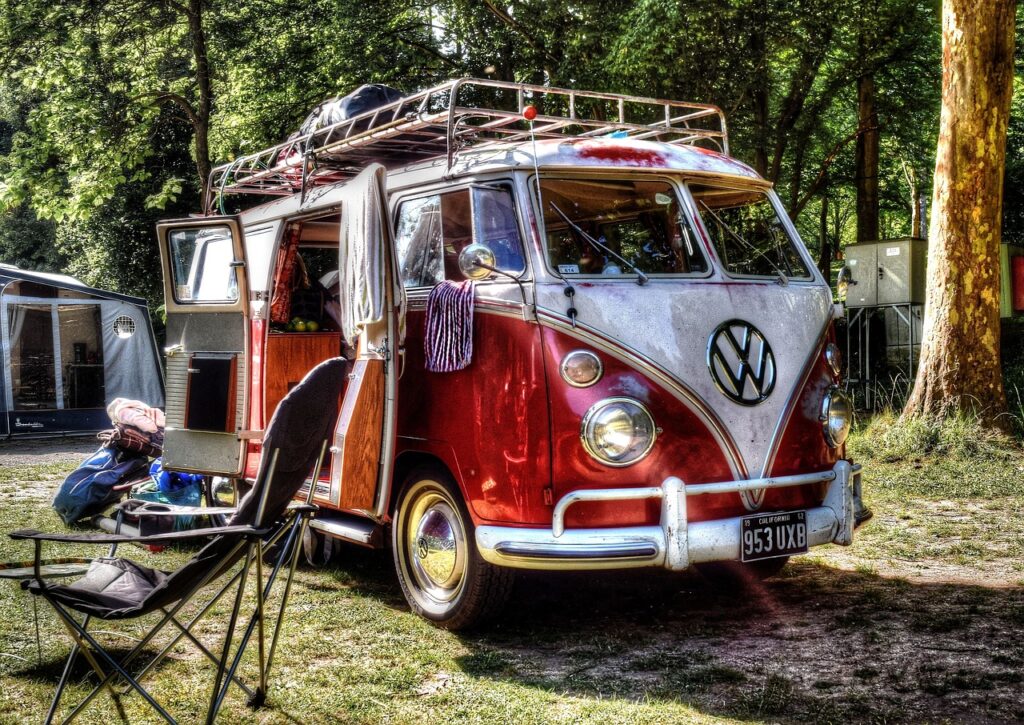Are you tired of the 9-to-5 grind and looking for a change of pace? Have you ever considered living out of a van, car, or RV and traveling the world full-time? If so, then you’re not alone. More and more people are embracing the van life as a way to explore new places, live closer to nature, and find freedom on the open road. But before you hit the road, it’s essential to prepare for the challenges and opportunities that come with full-time travel. In this guide, we’ll provide you with the tips, hacks, and pros and cons of living on the road.

Section 1: Choosing the Right Vehicle
Choosing the right vehicle is one of the most critical decisions you’ll make when it comes to full-time travel. There are several options to consider, including campervans, RVs, and converted vans.
Campervans are a popular option for those who want a small and agile vehicle that’s easy to park and drive. They’re also more affordable than RVs and often have better gas mileage. However, they may not have as much living space, storage, or amenities as larger vehicles.
RVs, on the other hand, come in a range of sizes and styles, from small Class B vans to large Class A motorhomes. They offer more living space, storage, and amenities, making them a better choice for those who want more comfort and convenience. However, they’re also more expensive, harder to maneuver, and have lower gas mileage.
Converted vans are another popular option for full-time travelers. They offer a good balance between space, comfort, and affordability. With a little creativity and DIY skills, you can convert a van into a comfortable and functional living space. However, converting a van can be time-consuming and may require some technical skills, such as electrical and plumbing knowledge.
Living out of a van, car, or RV requires some adjustments, but there are many convenience hacks you can use to make your life on the road easier. For example, you can install solar panels to generate power, use a portable toilet, and stock up on non-perishable foods. You can also make use of apps and websites like iOverlander and Harvest Hosts to find free or low-cost places to park overnight.
When it comes to financing, there are several options to consider, depending on your budget and credit score. If you have good credit, you may be able to secure a loan from a bank or credit union. RV dealerships also offer financing options, but they may come with higher interest rates and fees. If you’re on a tight budget, you can consider buying a used vehicle or converting a van yourself. This can save you money in the long run.
It’s also essential to factor in the cost of maintenance, repairs, and insurance when choosing a vehicle. RVs and larger vans may require more maintenance and repairs than smaller vehicles. Don’t forget that insurance costs may vary depending on the type of vehicle and your driving record.

Section 2: Money-Saving and Money-Making Hacks
Workamping: Workamping is a popular way for full-time travelers to earn some extra income while on the road. It involves working at campgrounds or RV parks in exchange for a free campsite. You may sometimes even receive a small stipend. Workamping jobs can include cleaning bathrooms, landscaping, or serving as a camp host. Check out websites like Workamper News and Workers on Wheels for job listings.
Digital Nomad Jobs: With the rise of remote work and the gig economy, there are many opportunities for digital nomads to work online while on the road. Popular digital nomad jobs include freelance writing, social media management, web design, and virtual assistant work. Have some of these skills but never freelanced? Check out websites like Upwork, Fiverr, and Remote.co for job listings.
Campground Memberships: If you plan to stay at campgrounds or RV parks frequently, consider investing in a campground membership. Memberships like Thousand Trails and Passport America offer discounted rates on camping fees, which can save you money in the long run.
National Park Passes: If you plan to visit national parks often, consider purchasing an annual national park pass. The pass costs $80 and grants you access to all national parks for one year. This can save you money on entrance fees, which can add up quickly.
Boondocking: Boondocking, or camping off-the-grid, is a great way to save money on camping fees. Many public lands, like Bureau of Land Management areas and national forests, allow free camping for up to 14 days. Just be sure to pack out all your trash and leave no trace.
Volunteer Work: If you’re looking for a way to give back while on the road, consider volunteering at a national park or wildlife refuge. Volunteer work can include trail maintenance, campground hosting, and educational programs. Check out websites like Volunteer.gov and Workamper News for opportunities.

Section 3: Living Closer to Nature
Living on the road means you’ll be spending a lot of time in nature, which can have numerous benefits for your physical and mental health. Studies show that spending time in nature can reduce stress, improve mood, and increase creativity. Living on the road also means you’ll have the opportunity to explore some of the world’s most beautiful and remote places, from national parks to off-the-beaten-path destinations. Let’s dive a bit deeper into some of the benefits and how to fully experience them.
Improved Health: Spending time in nature can have a positive impact on your physical and mental health. It can reduce stress, lower blood pressure, and boost your immune system. To fully experience the health benefits of nature, make sure to spend plenty of time outdoors. Whether that’s going for a hike, a swim, or just relaxing in a scenic spot.
Increased Productivity: Studies have shown that spending time in nature can also increase your productivity and creativity. To fully experience this benefit, consider setting up your workspace outdoors. You can use a portable table and chair or invest in a mobile office setup that allows you to work from your van or RV while enjoying the beauty of the great outdoors.
Environmental Awareness: Living closer to nature can also help you become more environmentally aware and conscious. You’ll be more attuned to the impact of your daily habits on the environment and more likely to take steps to reduce your carbon footprint. To fully experience this benefit, consider practicing Leave No Trace principles and using sustainable products in your daily life on the road.
Adventure and Exploration: Living on the road full-time allows you to explore and experience nature in all its forms. You can hike in the mountains, swim in the ocean, and camp under the stars. To fully experience the adventure and exploration that nature offers, make sure to plan ahead and research the best places to visit and the most scenic routes to take.
Community and Connection: Living on the road full-time also allows you to connect with other like-minded individuals who share your love of nature and adventure. There are many online communities and social media groups that bring together full-time travelers who live in vans, cars, or RVs. To fully experience the community and connection that living on the road can offer, consider attending meetups or events and making new friends along the way.

Section 4: Pros & Cons of Full-Time Travel
Full-time travel can be a dream come true for many, but it’s important to weigh the pros and cons before embarking on this lifestyle. Here are some of the main advantages and disadvantages of full-time travel.
Pros
Freedom and Flexibility: Full-time travel allows you to have complete freedom and flexibility in your life. You can go wherever you want, whenever you want, and stay for as long as you want.
Adventure and Exploration: Living on the road full-time offers endless opportunities for adventure and exploration. You can see new places, try new things, and experience different cultures.
Cost Savings: Full-time travel can also be a cost-effective way of living. You can save money on rent, utilities, and other expenses associated with a stationary lifestyle.
Minimalist Lifestyle: Living on the road requires you to downsize your possessions and live a more minimalist lifestyle. This can be liberating and help you focus on what’s truly important in life.
Cons
Lack of Stability: Full-time travel can be unpredictable and unstable. You may not have a permanent address, which can make it difficult to receive mail, register to vote, or access certain services.
Loneliness: Living on the road full-time can also be lonely, especially if you’re traveling solo. You may not have a stable community or support network, which can be challenging for some people.
Maintenance and Repairs: Full-time travel can be hard on your vehicle, and you may encounter breakdowns or other maintenance issues along the way. This can be stressful and expensive.
Planning and Logistics: Full-time travel requires careful planning and logistics, especially if you’re traveling to different states or countries. You need to plan for fuel, food, water, and other essentials, as well as research the rules and regulations of different areas.
Conclusion
Living on the road can be an exciting and liberating experience, but it requires careful planning and preparation. By choosing the right vehicle, making use of convenience hacks, and spending time in nature, you can make your life on the road more comfortable and enjoyable. However, it’s important to be aware of the pros and cons of full-time travel and to be prepared for the challenges that come with living in a small space. If you’re ready for a change of pace and want to explore the world on your own terms, then living on the road may be the perfect choice for you.
